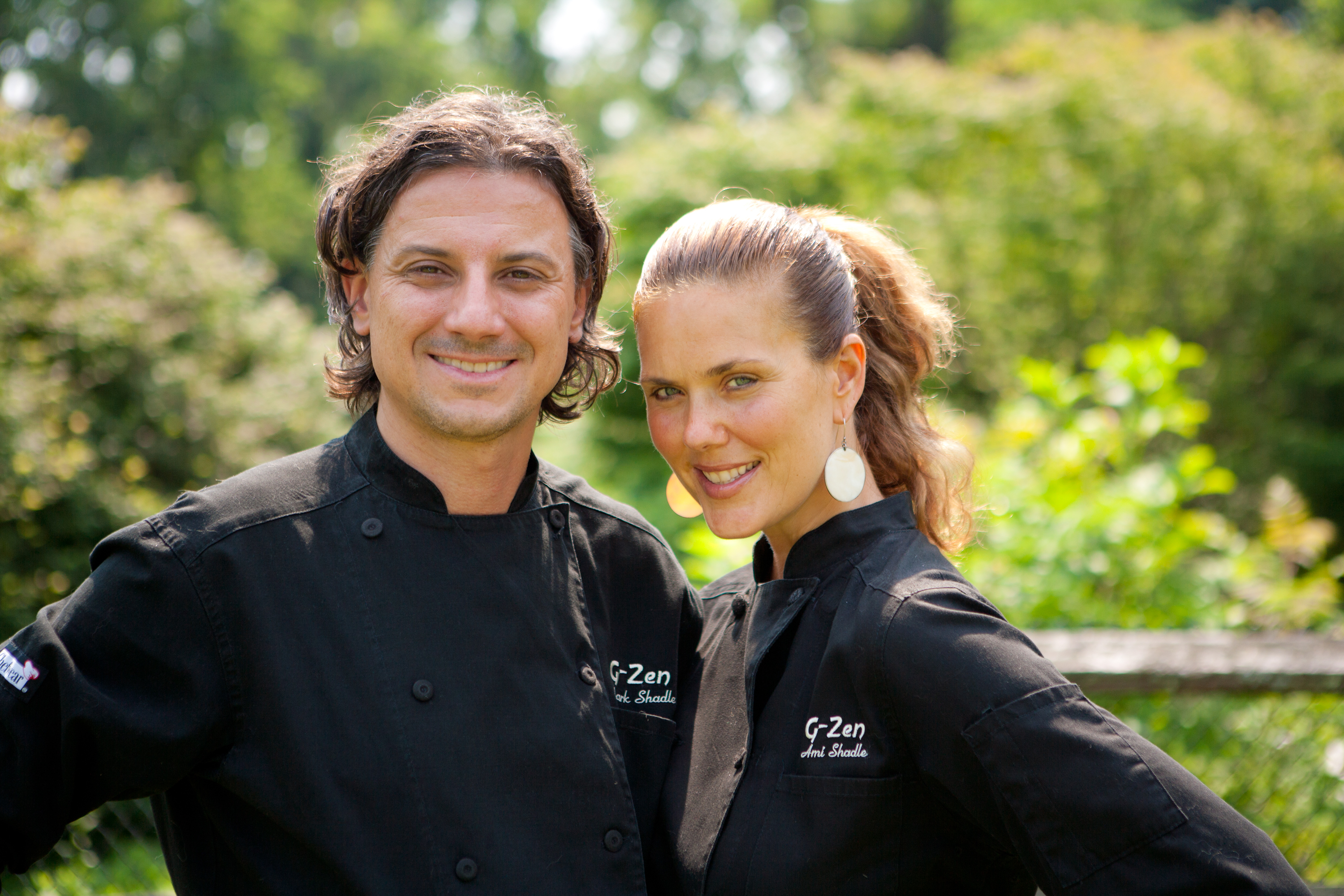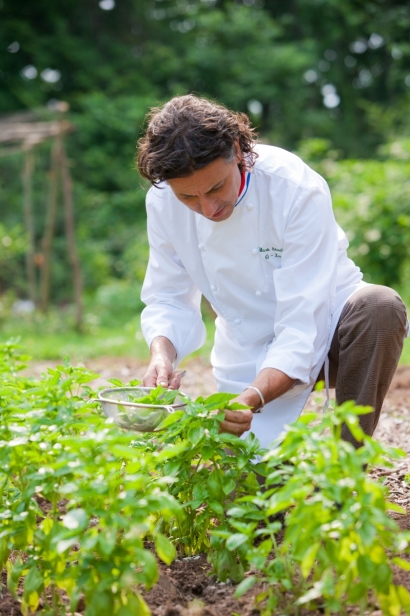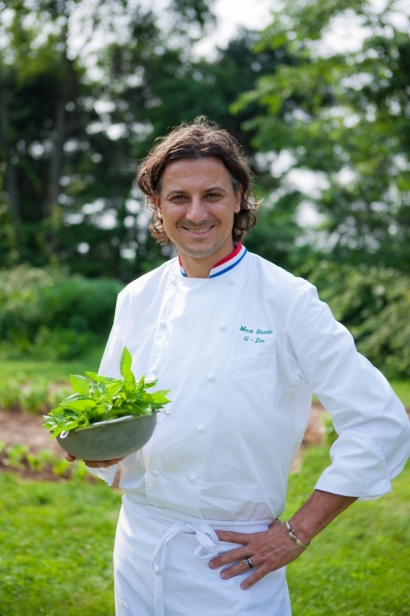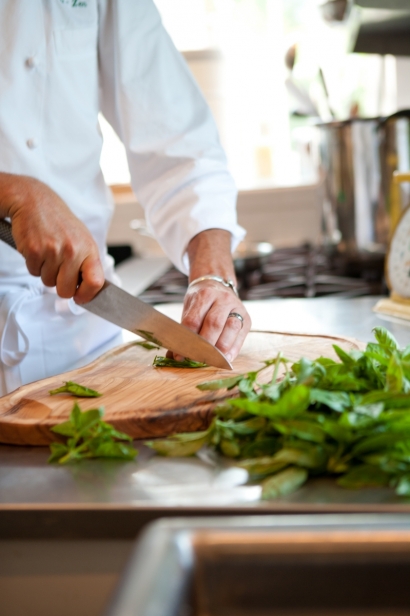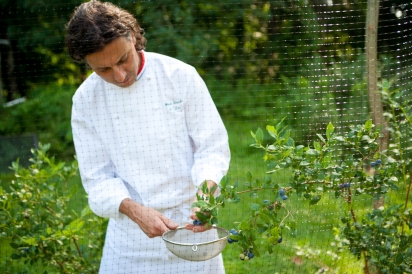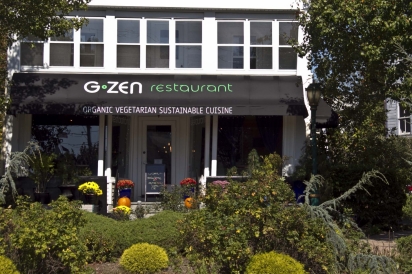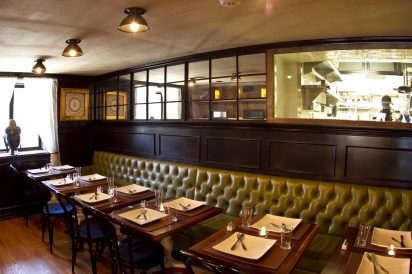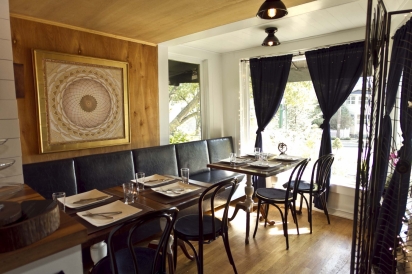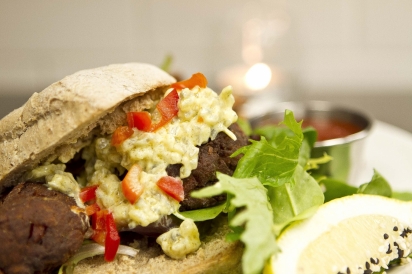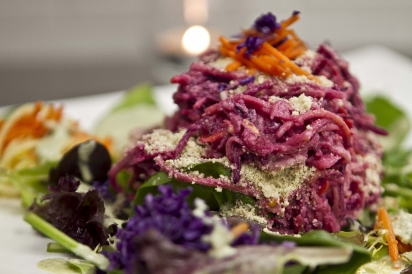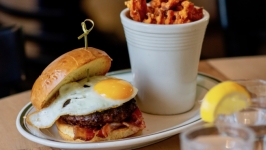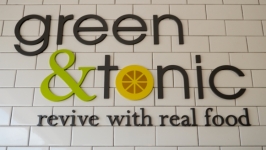State of Zen: Sustainable Practices and Vegan Cuisine Rule at G-Zen
In terms of dining options, vegans rarely have very many choices. Perhaps they’re lucky enough to find one or two items on any given menu (and maybe just a “house salad,” at that), but for the most part, vegans are relegated to their own kitchens, if they want to eat something delicious. Since 2011, however, New Haven-area vegetarians and vegans have been able to enjoy G-Zen Restaurant in Branford, a mission-driven, dedicated vegan establishment, all their own.
Founded and run by CEO Ami Beach and her husband, Executive Chef Mark Shadle, G-Zen is just one part of an ever-growing enterprise. “It takes a vegan army to do what we do,” says Beach, and she isn’t exaggerating. In addition to the brick-and-mortar restaurant, Beach and Shadle also run the Gmonkey organic food truck, manage a two-acre farm, are writing a soon-to-be-released cookbook and lifestyle guide, and produce a line of organic, fresh-pressed juices called G-Glow.
Shadle, who grew up in Middletown, is formerly the co-owner and chef at ION Restaurant (It’s Only Natural) in Middletown. Eight years ago, he opened G-Zen and has since created a G-empire. Shadle and Beach, in addition to pastry chef Stacy Attenberg and Sous Chef Michael Richotte, work tirelessly to build a sustainable business that drives (on biodiesel, of course) their mission. “We’re not just farm to table but actually are seed to table,” Beach says. “We’re saving our own seeds, sprouting them, harvesting them, cooking with them, and starting that whole process over again.
Shadle has been both a vegan and vegan chef for three decades. A former competitive bike racer, Shadle found that he was physically stronger and performed better when he consumed an exclusively plant-based diet. Although he hasn’t always been vegan, he was raised by parents who were passionate gardeners and dedicated home cooks. “My mom and dad both grew up on farms, so I had a massive garden when I was growing up. We had 110 types of vegetables, four types of beans, four types of potatoes. My mother cooked every single meal. She made her own peanut butter, her own bread. We didn’t eat processed foods, so it was a very clean diet.”
Shadle’s early exposure to gardening, an understanding of food sourcing, and an appreciation for everything homemade has shaped him into the chef and farmer he is today. Self-taught, he has spent nearly his entire career working as a vegan chef, with a brief stint working in a French restaurant in Hartford. Despite the stark contrast between French cooking (which is notorious for fattening ingredients, like butter and heavy cream) and vegan cooking, Shadle notes that the basic principles remain consistent between the two. “There are similar principles, like using wholesome ingredients and having a respect for the farmers. The fundamentals of cooking are based in French technique.”
Quality ingredients and sustainable practices are core to Beach and Shadle’s mission. Instead of purchasing from industrial farms, they grow dozens of seasonal crops on their solar-driven farm in Durham, and Shadle cooks with them daily. At the end of each day’s dinner service, Shadle brings five eight-gallon buckets of compost from the restaurant to the farm. Vegetable peelings, coffee grounds, and even take-out containers are composted and later turned into the soil that Shadle uses on his own farm. He estimates that, since opening G-Zen, he has kept approximately 260 tons of garbage out of Connecticut’s landfills by opting to compost. “I try to do my part as legitimately as I can and be a living example.
Staying true to these values is a demanding task, as Shadle notes when he points out some of the key challenges of running a restaurant and operating a farm, two notoriously demanding jobs. “In the restaurant, the clock sort of starts at dinner time. When you’re on the farm, nature predicts when things are going to be ready and when it’ll be time for harvest. You have to figure out how to use 600 peaches that are otherwise going to sit on the ground and rot.”
Finding ways to best make use of the farm’s produce lies at the heart of Shadle and Beach’s zero-waste mission, but it doesn’t end there. Just outside the restaurant, five household recycling bins are filled with the little paper and plastic waste that G-Zen does produce. Beside them stands a single household garbage bin. “This is our only garbage. There’s about four garbage bags in there, and I haven’t emptied it in over a week,” Shadle says. Everything at G-Zen is done with intention and environmental consciousness. Grease is stored, recycled, and turned into biodiesel. Guests sip not on tap water, but rather water that has been filtered using reverse osmosis technology. Their tables are custom made from recycled pipes and reclaimed wood from an old barn.
Of course, for most patrons, the food is the real star. Nearly every item on the menu at G-Zen is made in house, include ketchup, “nayonaisse” (egg-free mayonnaise), pasta, sauerkraut, and even seitan, a wheat-based meat alternative commonly used in vegan cooking. “Especially in the past, there was this misconception that you were going to go to vegetarian and vegan restaurants and eat twigs and berries. You were going to have a veggie burger that tastes like a hockey puck, and you were going to be deprived of cheese and ice cream,” says Beach. G-Zen’s detailed nine-page menu, however, defies these stereotypes. The menu, which includes a large portion of gluten-free items, lists comfort dishes like lasagna, made with an egg-free pasta dough and silken tofu lasagna; a black bean, quinoa, and rice-based veggie burger; egg-free ravioli naturally flavored and colored with beet or carrot juice; artisan cheese plates that feature cashew-based cheeses with unconventional flavors, like pineapple, goji berry, and Kalamata olives; Spanakopita, a traditional Greek pie that Shadle makes with tofu rather than feta; crab cakes that employ Old-Bay-seasoned tempeh in place of crab; and “calamari” made of hearts of palm with dandelion fritters as garnish.
While it might seem challenging to make veggie-friendly versions of carnivores’ favorite dishes, Shadle insists that all it takes is a bit of creativity and experience. “You just veganize them,” he says. “It’s what vegan chefs do — we veganize our mother’s famous sticky bun recipe or our grandmother’s famous Swedish meatballs. It’s just a matter of replacing the dairy and meat items with a vegan version.
Since opening, G-Zen has won numerous sustainability awards from both national and Connecticut-based groups, but Shadle and Beach’s mission continues well beyond the boundaries of our state. They also own a small farm in Culebra, Puerto Rico, where they are trying to inspire a similar green movement. “In Puerto Rico, the traditional forms of cooking have been lost out of convenience,” Shadle says. “The land down there is so fertile, and there is so much potential to have year-round growing, but people get away from it, because of the labor involved and lack of knowledge.”
Shadle and Beach’s support for sustainability both in and out of the kitchen may spare no detail, but there are simpler steps that anyone can take at home. “I highly encourage people to start their own small garden and give back to the community,” says Shadle. “Shop at your local farm stands and farmers markets.” Of course, taking a seat at G-Zen is another way to support both a local business and a more sustainable, mission-driven way of living, here in Connecticut. As Beach remarks, “this isn’t just a business; it’s our life.” For Shadle and Beach, the incredible dishes that result from that marriage of mission and profession are simply the ginger creme icing on their spiced carrot cake.
G-Zen is open Tuesday-Thursday, 4:00-9:00pm; Friday, 4:00-9:30pm; Saturday 11:00am-9:30pm. Reservations are highly recommended
> G-Zen Restaurant: 2 East Main St., Branford; 203-208-0443


